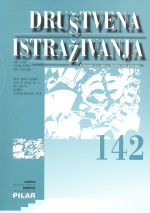UČINCI STEM INTERVENCIJSKOGA PROGRAMA U OSNOVNIM ŠKOLAMA NA STAVOVE I INTERESE UČENIKA: PRIMJENA TEHNIKE UPARIVANJA PREMA SKLONOSTI
THE EFFECTS OF THE ELEMENTARY SCHOOL STEM INTERVENTION PROGRAM ON STUDENTS' ATTITUDES AND INTERESTS: THE APPLICATION OF PROPENSITY SCORE MATCHING TECHNIQUE
Author(s): Toni Babarović, Predrag PALE, Josip BurušićSubject(s): Education, School education, Evaluation research, Sociology of Education
Published by: Institut društvenih znanosti Ivo Pilar
Keywords: STEM; effectiveness of intervention; Propensity Score Matching; attitudes toward scientists; interests in STEM;
Summary/Abstract: There is a growing number of interventions intended to increase students' STEM school achievement and their interests in STEM careers. Conjointly, various methodological challenges in designing, implementation and evaluation of STEM interventions are recognized. In this paper, we evaluated the effectiveness of one STEM intervention by means of a quasi-experimental research design, on the sample of 1484 elementary school students, age 10 to 12 years. The effectiveness of the intervention was measured by change in attitudes toward scientists and by change in STEM interests. We used the Propensity Score Matching (PSM) technique to evaluate the effectiveness of the intervention. The results showed that the STEM intervention modestly increased positive attitudes toward scientists in the whole sample, and increased STEM interests of the youngest students. The research has also shown that the PMS technique has its application in evaluation studies of different educational interventions.
Journal: Društvena istraživanja - Časopis za opća društvena pitanja
- Issue Year: 27/2018
- Issue No: 4
- Page Range: 583-604
- Page Count: 22
- Language: Croatian

